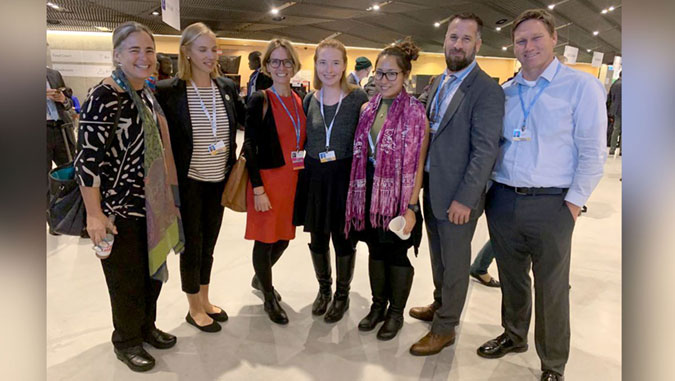
The eyes of the world are focused on the climate crisis negotiations for the next two weeks as more than 200 world leaders and 20,000 participants, including six from the University of Hawaiʻi at Mānoa, gather in Glasgow, Scotland, U.K. for the annual United Nations Framework Convention on Climate Change (UNFCCC).
The UH Mānoa faculty and students, from the School of Ocean and Earth Science and Technology (SOEST) and William S. Richardson School of Law, will travel to Glasgow as an official observer delegation to the 26th Conference of the Parties (COP) at the UNFCCC, running from October 31 to November 12.
Approximately 200 nations around the world meet each year at COP to negotiate advancements in international climate law and policy. In 2015, COP yielded the now-famous Paris Agreement. This year, the parties will be negotiating issues such as carbon market mechanisms, climate funding for vulnerable countries, and accelerating domestic decarbonization targets.
This year, the UH law school’s Environmental Law Program (ELP) has joined forces with SOEST for the delegation. UH law school members include students Joseph Udell and Naima Te Maile, along with faculty members David Forman and Denise Antolini. From SOEST, Associate Dean Chip Fletcher and recent ELP graduate Colin Lee, who is working with Fletcher as a climate change and resilience policy analyst, will be attending. ELP faculty Richard Wallsgrove is coordinating the delegation from Honolulu.
“We borrowed planet Earth from our children and were poor stewards,” said Fletcher. “For future generations to thrive as we have, it is critical that we transform an economy that for more than two centuries has depended on fossil fuels, land clearing and indiscriminate waste disposal.”
“Climate change is accelerating, but it is still possible to arrest global warming at the U.N. target of 1.5 degrees Celsius with the elimination of greenhouse gas emissions by mid-century,” Fletcher added. “This requires government policies that promote: net-zero buildings, renewable energy production and storage, clean industry and transportation and technology that removes carbon dioxide, refocusing ecosystem services toward sustainability, and investing in the preservation of natural capital. Without bold and transformative action in these sectors, we not only risk out-of-control climate change, but also the very resources that provide life.”
This will be the third time that UH has sent an official delegation to the UNFCCC. The UH law school’s ELP led the UH delegations in 2018 (Katowice, Poland) and 2019 (Madrid, Spain).
Antolini said, “Having our faculty and students directly engaged with and learning in-person from world leaders, climate negotiators, activists, scientists and community groups all deeply committed to solving the climate crisis is an extraordinary opportunity. The climate challenge has called our UH and larger Hawaiʻi delegation, which include the governor and top state officials, to the global stage. To Glasgow, we will bring the success stories of Hawaiʻi’s bold leadership on climate solutions. From Glasgow, we will bring home the best and latest thinking on law, science and policy to share with our students, colleagues and the State Legislature and counties. We have no time to waste as we work together to meet the ambitious but achievable state and global net-zero targets for 2030 and 2045.”
This event is an example of UH Mānoa’s goal of Excellence in Research: Advancing the Research and Creative Work Enterprise (PDF), Enhancing Student Success (PDF) and Building a Sustainable and Resilient Campus Environment: Within the Global Sustainability and Climate Resilience Movement (PDF), three of four goals identified in the 2015–25 Strategic Plan (PDF), updated in December 2020.

